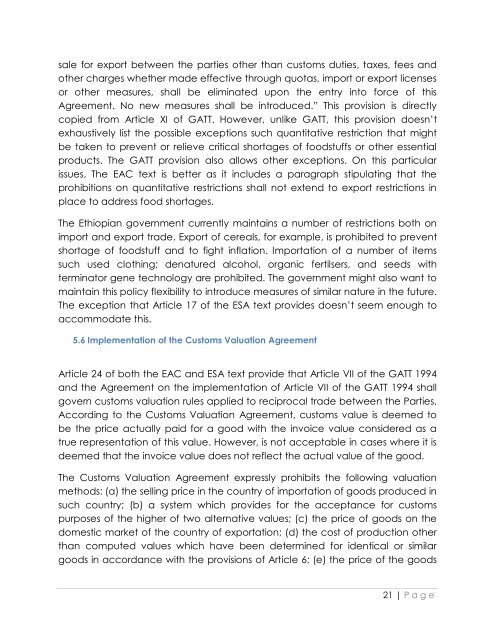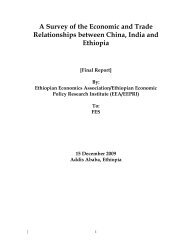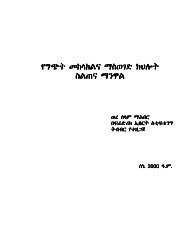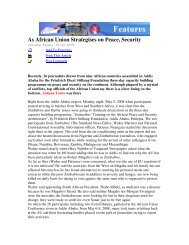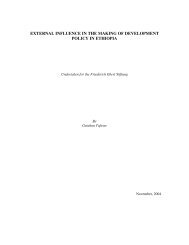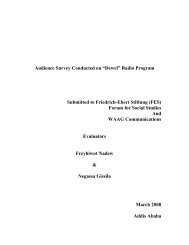Ethiopia and EPA Negotiation 2008 - FES Ethiopia
Ethiopia and EPA Negotiation 2008 - FES Ethiopia
Ethiopia and EPA Negotiation 2008 - FES Ethiopia
Create successful ePaper yourself
Turn your PDF publications into a flip-book with our unique Google optimized e-Paper software.
sale for export between the parties other than customs duties, taxes, fees <strong>and</strong><br />
other charges whether made effective through quotas, import or export licenses<br />
or other measures, shall be eliminated upon the entry into force of this<br />
Agreement. No new measures shall be introduced.” This provision is directly<br />
copied from Article XI of GATT. However, unlike GATT, this provision doesn’t<br />
exhaustively list the possible exceptions such quantitative restriction that might<br />
be taken to prevent or relieve critical shortages of foodstuffs or other essential<br />
products. The GATT provision also allows other exceptions. On this particular<br />
issues, The EAC text is better as it includes a paragraph stipulating that the<br />
prohibitions on quantitative restrictions shall not extend to export restrictions in<br />
place to address food shortages.<br />
The <strong>Ethiopia</strong>n government currently maintains a number of restrictions both on<br />
import <strong>and</strong> export trade. Export of cereals, for example, is prohibited to prevent<br />
shortage of foodstuff <strong>and</strong> to fight inflation. Importation of a number of items<br />
such used clothing; denatured alcohol, organic fertilsers, <strong>and</strong> seeds with<br />
terminator gene technology are prohibited. The government might also want to<br />
maintain this policy flexibility to introduce measures of similar nature in the future.<br />
The exception that Article 17 of the ESA text provides doesn’t seem enough to<br />
accommodate this.<br />
5.6 Implementation of the Customs Valuation Agreement<br />
Article 24 of both the EAC <strong>and</strong> ESA text provide that Article VII of the GATT 1994<br />
<strong>and</strong> the Agreement on the implementation of Article VII of the GATT 1994 shall<br />
govern customs valuation rules applied to reciprocal trade between the Parties.<br />
According to the Customs Valuation Agreement, customs value is deemed to<br />
be the price actually paid for a good with the invoice value considered as a<br />
true representation of this value. However, is not acceptable in cases where it is<br />
deemed that the invoice value does not reflect the actual value of the good.<br />
The Customs Valuation Agreement expressly prohibits the following valuation<br />
methods: (a) the selling price in the country of importation of goods produced in<br />
such country; (b) a system which provides for the acceptance for customs<br />
purposes of the higher of two alternative values; (c) the price of goods on the<br />
domestic market of the country of exportation; (d) the cost of production other<br />
than computed values which have been determined for identical or similar<br />
goods in accordance with the provisions of Article 6; (e) the price of the goods<br />
21 | P a g e


